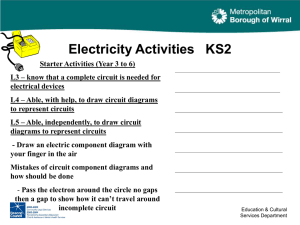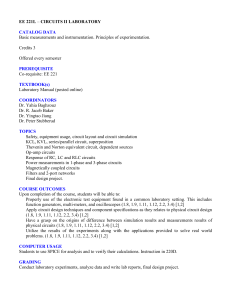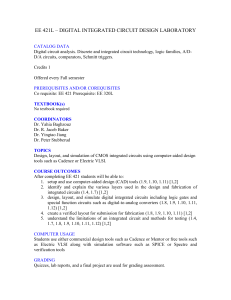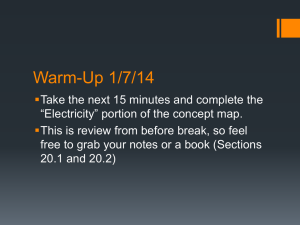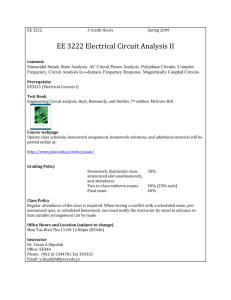20.3 Electric Circuits
advertisement
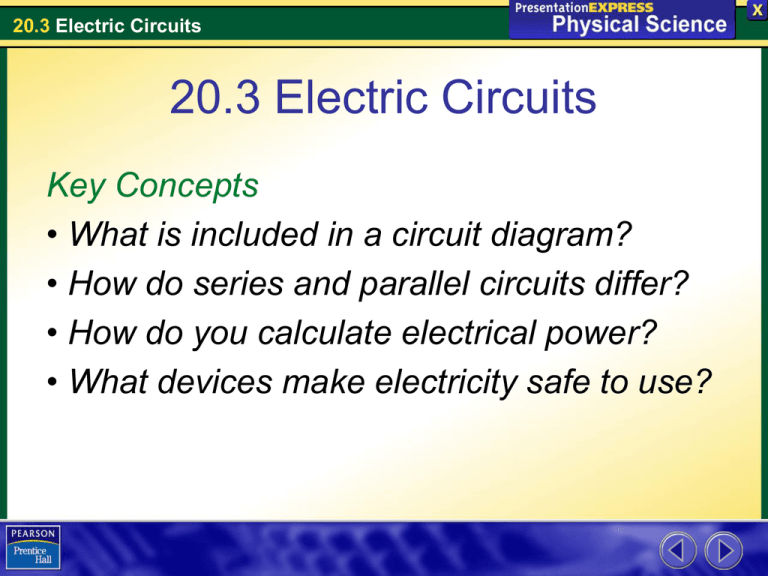
20.3 Electric Circuits 20.3 Electric Circuits Key Concepts • What is included in a circuit diagram? • How do series and parallel circuits differ? • How do you calculate electrical power? • What devices make electricity safe to use? 20.3 Electric Circuits To bring electric current into a building, an electrician installs wires _______________ 20.3 Electric Circuits Circuit Diagrams pathway An electric circuit is a complete ___________ through which charge can flow. symbols Circuit diagrams use ________________ to represent parts of a circuit, including a source of electrical energy and devices that are run by the electrical energy. 20.3 Electric Circuits Circuit Diagrams arrows • ____________ show the direction of current, from positive to negative. Direction of current Switch Energy source 20.3 Electric Circuits Circuit Diagrams • Switches show places where the circuit can be _____________. opened • The circuit diagram also uses a symbol to represent source the _________ of energy Direction of current Switch + • Neg. terminal = _____ Pos. terminal = _____ Energy source 20.3 Electric Circuits Series Circuits If one element stops functioning in a series circuit, none __________ of the elements can operate. If one element stops functioning in a parallel circuit, still the rest of the elements _______________ operate. 20.3 Electric Circuits Series Circuits one path A series circuit has _______ _______ that each charge can follow. 20.3 Electric Circuits Parallel Circuits more A parallel circuit has ________ than one path each charge can follow. 20.3 Electric Circuits Parallel Circuits parallel Most circuits in a house are _______________. Even if one device stops working, the others will still work. 20.3 Electric Circuits Power and Energy Calculations The rate at which electrical energy is converted to another ________________ form of energy is called ________________ __________. electric power Recall that power is the rate of doing work. The unit of electric power is the joule per second, or watt ______________(W). Power often is measured in thousands of watts, or ____________________ (kW). kilowatts 20.3 Electric Circuits Power and Energy Calculations Electric power can be calculated by current voltage multiplying _____________ by ___________. power current voltage 20.3 Electric Circuits Power and Energy Calculations Calculating Electric Power An electric oven is connected to a 240-volt line, and it uses 34 amps of current. What is the power used by the oven? P = 34 amps x 240 volts = 8,200 watts power current voltage 20.3 Electric Circuits Power and Energy Calculations An appliance's power rating lets you know how much power it uses under ________________ normal conditions. Example: An electric stove uses about 6000 watts, and a microwave oven uses about 1000 watts. 20.3 Electric Circuits Power and Energy Calculations You can find the electrical energy used by an appliance by multiplying ____________ by power __________. time 20.3 Electric Circuits Power and Energy Calculations The power rating of a typical clothes dryer is 5.4 kilowatts. If you use the clothes dryer for 2 hours, what is the energy use? E = 5.4 kilowatts x 2 hours = 10.8 kilowatt-hours 20.3 Electric Circuits Electric power companies usually determine charges on your electric bill using Kilowatt-hours _________________. A kilowatt-hour equals 3,600,000 joules. 20.3 Electric Circuits Electrical Safety Most household circuits usually have an average voltage of 120 volts. increases Each device that is turned on _________________ the current. If the current exceeds the circuit’s safety limit, the overheat wire may _________________. 20.3 Electric Circuits Electrical Safety Several methods or devices help make electrical energy safe to use… correct • _______________ wiring fuses • ______________ breakers • circuit ________________ insulation • _____________________ • _______________ plugs grounded 20.3 Electric Circuits Home Safety melts if Fuses have an internal wire that ________ a current is too great….prevents current overload. “Blowing a fuse” 20.3 Electric Circuits Home Safety A circuit breaker is a switch that _______________ when current in a circuit is too opens high…prevents current overload. The circuit breaker must be reset before the circuit can be used again. 20.3 Electric Circuits Personal Safety insulated Electrical wiring in a home is _________________ to protect people. If the insulation is damaged, you may accidentally touch the bare wire and get a _____________. shock Avoid touching electrical devices with wet ___________ hands, because your hands conduct current more readily when they are wet. 20.3 Electric Circuits short Insulation also prevents ___________ circuits… when a current finds a short path through a circuit with ____________ resistance. less three A ____________-prong plug can prevent shocks caused by short circuits. If a short circuit develops, the current takes an ground easier path to the _____________through the grounding wire instead of your body! 20.3 Electric Circuits Electrical Safety The transfer of excess charge through a conductor to Earth is called _________________ grounding Even a small current in your body can cause a painful shock or injury. 20.3 Electric Circuits Assessment Questions 1. A number of light bulbs are connected to an energy source in a series circuit. What will happen to the other bulbs if one of the bulbs burns out? a. b. c. d. Nothing will happen. They will be brighter. They will be dimmer. They will turn off. 20.3 Electric Circuits Assessment Questions 2. A pair of computer speakers are connected to a 12-volt power supply with a current of 1.25 amps running through them. What is the electric power? a. b. c. d. 0.8 watt 1.25 watt 12.5 watt 15 watt 20.3 Electric Circuits Assessment Questions 3. A fuse has a switch that opens to prevent overheating when the current in a circuit is too high. True False
